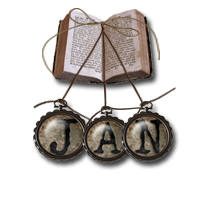What if all of London were really an amusement park—a whole city returned to Victorian times to entertain visitors from the twenty-first century? That's the wildly original premise of Ian Beck's Pastworld, a high-stakes mystery set in a simulated past.
Eve is a lifelong resident of Pastworld who doesn’t know she’s living in a theme park until a mysterious threat forces her to leave home. Caleb is a visiting tourist who finds the lawlessness of the past thrilling—until he suddenly becomes a fugitive from an antiquated justice system. And in the midst of it all, in the thick London fog a dark and deadly figure prowls, claiming victim after victim. He’s the Fantom, a creature both of the past and of the present, in whose dark purpose Caleb and Eve will find their destinies combined. (From GoodReads)
The premise of Pastworld is the reason I picked the book up. I found the whole idea of a Victorian theme park complete with a Jack the Ripper type villain irresistible. Pastworld’s plot is complex, establishing several different conflicts that at first seem random, but are eventually tied together and resolved satisfactorily in the end. However, this randomness could easily confuse younger middle school readers.
Another confusing aspect was Beck’s choices of narration. The book begins with a forward from Chief Inspector Charles Catchpole, Scotland Yard (Pastworld Division), who explains that he is the narrator. However, the chapters alternate between third person narration (Catchpole’s) and Eve’s journal, which is first person and written in italics. This confusion was short lived once I accepted that despite the forward, Catchpole’s narration would maintain the third person POV. The reason I think Beck chose to handle the POV in this manner was to ensure that Catchpole’s narration read like an official record of the events that transpired.
I also found that Beck’s characters were just character who were playing parts. There was very little that made me connect to any of them. Eve told her story through her journal and while there were times when she expressed emotions, she never felt real. Perhaps that was what Beck was aiming at because of the revelation that comes at the end, which I will not reveal here. I also didn’t connect with Caleb. He was too flat and never did show growth. The only character I did like was Bible J., who ended up being the hero risking his own life for Eve.
Beck’s setting however, was authentically drawn and created a mood that carried both the story and the characters. The setting not only played a huge role in sustaining the suspense, but the theme park itself was an antagonist, working against the protagonists most of the time. This was by far my favorite facet of the story.
Despite many elements that bothered me about Pastworld, I read with interest and continually tried to piece together the various clues that Beck provided through out the story. However, as stories go I did not find Pastworld a story I would consider a must read.
Another confusing aspect was Beck’s choices of narration. The book begins with a forward from Chief Inspector Charles Catchpole, Scotland Yard (Pastworld Division), who explains that he is the narrator. However, the chapters alternate between third person narration (Catchpole’s) and Eve’s journal, which is first person and written in italics. This confusion was short lived once I accepted that despite the forward, Catchpole’s narration would maintain the third person POV. The reason I think Beck chose to handle the POV in this manner was to ensure that Catchpole’s narration read like an official record of the events that transpired.
I also found that Beck’s characters were just character who were playing parts. There was very little that made me connect to any of them. Eve told her story through her journal and while there were times when she expressed emotions, she never felt real. Perhaps that was what Beck was aiming at because of the revelation that comes at the end, which I will not reveal here. I also didn’t connect with Caleb. He was too flat and never did show growth. The only character I did like was Bible J., who ended up being the hero risking his own life for Eve.
Beck’s setting however, was authentically drawn and created a mood that carried both the story and the characters. The setting not only played a huge role in sustaining the suspense, but the theme park itself was an antagonist, working against the protagonists most of the time. This was by far my favorite facet of the story.
Despite many elements that bothered me about Pastworld, I read with interest and continually tried to piece together the various clues that Beck provided through out the story. However, as stories go I did not find Pastworld a story I would consider a must read.

































0 comments:
Post a Comment